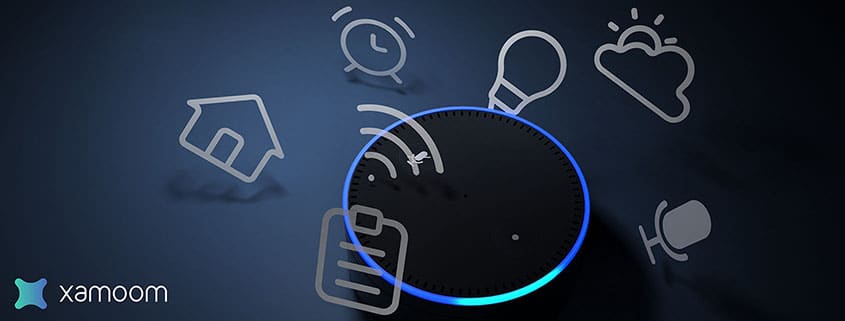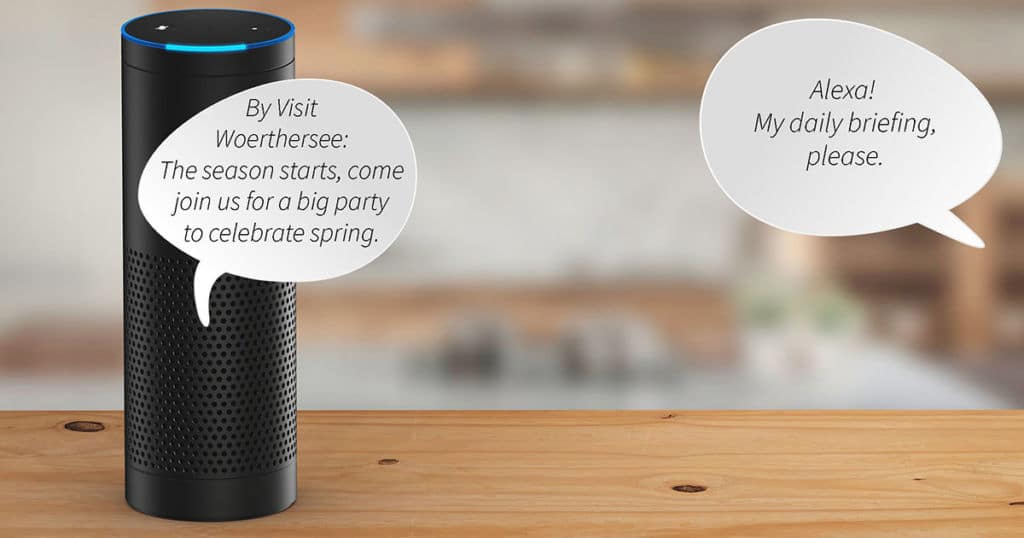It was one of the great technology moments in recent years: Apple’s presentation of Siri in 2011. With it, voice assistants became ready for the mass market. Previously, you had to comply with prescribed phrases like
Call Anna
and much more did not work either. Siri doesn’t just answer the question about the weather forecast. You can also ask this question in many different ways. Here some examples:
How will the weather be?
Is it raining tonight?
What is the chance of a sunny tomorrow?
Do I need an umbrella?
Isn’t it nice when technology understands the human and it doesn’t have to be the other way around?
Meanwhile, voice assistants are widespread. They are not only part of the smartphone like Siri or Google Assistant, but they are also found in many living rooms, kitchens or offices. The threshold for low-tech people to communicate with Amazon Alexa, Google Home or Microsoft Cortana has also been reduced because they come no longer in form of computers, tablets or mobile phones.
The start is entertaining and arouses curiosity: you start speaking to the device, try out the one or the other question, ask Alexa to tell a joke or sing a song. Over time, you learn to make appointments and save tasks, use music services, set the cookie timer while both hands are deep in the dough, or even control the smart home. Everyone who has already dealt with voice assistants thinks of them as a relief and enrichment for everyday life.
Indeed, personal assistants and voice control are here to stay and they find new habitats over time. In 2018, Alexa will make its way into cars from BMW to Toyota and will also settle within Windows 10 computers.
A new and very personal channel for companies
Companies and institutions thus get a new, even more, personal channels directly into the living room of their customers, guests or tenants – and this channel wants to be used. Just as social media has been providing a new way of communicating for the last few years.
Again, it is important to reach people where it is relevant to them, but this time the medium is radically different. No pretty website, no big pictures, no long texts, no likes, no shares, no recommendations from friends – just pure language and it all starts with a real personal question:
As a citizen of a town: “What events are there in the vicinity?”
As a guest in a hotel: “What is there for breakfast today?”
As someone planning his vacation: “What can I experience in the region?”
As a tenant of an apartment: “When will the garbage collection?”
To answer such questions with the help of the voice assistant, you need two things:
- a CMS that quickly and easily manages the answers to the questions of your audience and
- integration in the voice assistant
xamoom for Alexa
Amazon Echo (or its iconic voice “Alexa”) is the first voice assistant that allows development of such services. In addition, the Echo already has impressive installation figures. In the US alone, there are estimations of around 31 million Echos as opposed to around 20 million Google Home devices (End 2017).
If you want to offer services for Alexa, the xamoom CMS is exactly what you need. Using the flexible editor and tagging of pages, companies can easily create and update content (better: answers).
You do not have to worry about the complexity behind the spoken user interaction. The language model is part of a so-called “custom skill”, comes from xamoom and is tailored to your needs and those of your customers.
Alexa for media
In addition, you can ask voice assistants quite trivial things like
“Alexa, what’s new?”
The result is an MP3 file or a short text that Alexa reads to you. Of course, the user has to choose from a selection of news sources first. From within the xamoom CMS you can also publish these so-called “Flash Briefing Skills”.
Try for yourself
Well, you can try our skills – but for the moment only if you speak and understand German. For our longtime customer Wörthersee Tourism, we have developed and published a tourism guide skill. To install it, go to amzn.to/2sZHKhQ.
Activate and try out the “Visit Woerthersee” skill in the Amazon Alexa app. First, start the skill.
Alexa, start Visit Woerthersee.
Then ask questions like:
Alexa, what can I do with pets at the lake?
Alexa, can I ride a mountain bike around the lake?
Alexa, which events take place on the weekend?
Alexa, what do you know about the town Velden?
Alexa, what can one do on the lake?
Currently, this skill is used to inform potential visitors about the offers around the lake before they start their holiday. But this is only the beginning.
We are already in the middle of the development of the second stage to bring the personal assistant into hotel rooms and to inform guests with up-to-date information about the respective resort. The virtual concierge is handed over to the guest at the front desk and activated by plugging in at the room.
Better service, more revenue
Voice services based on Alexa are just the beginning for us. As soon as this becomes possible, we will start developing for Google Home and (we do not give up hope) Siri.
Service like these enhance service quality and increases revenue based on which offers guests or customers are directed to. If you do want to reach your target group on this new channel too, we are happy to help. Simply contact us (+43-463-930 330 or mail@xamoom.com) and we will gladly show you the possibilities and potential.
Photos © folienfeuer, ht2000/Adobe Stock

